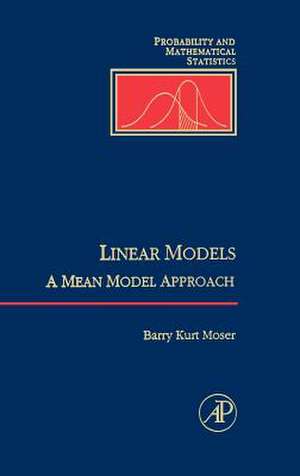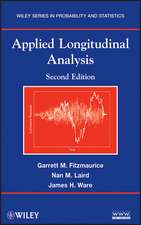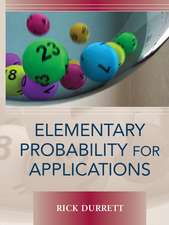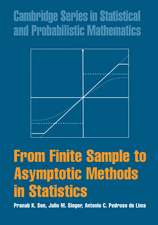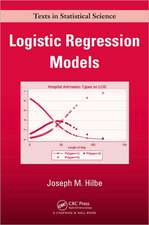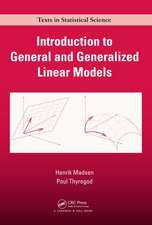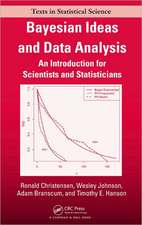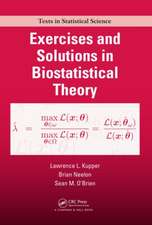Linear Models: A Mean Model Approach: Probability and Mathematical Statistics
Autor William R. Moser Zbynek Sidak, David Aldous, Pranab K. Senen Limba Engleză Hardback – 17 oct 1996
- Provides a versatile format for investigating linear model theory, using the mean model
- Uses examples that are familiar to the student:
- Design of experiments, analysis of variance, regression, and normal distribution theory
- Includes a review of relevant linear algebra concepts
- Contains fully worked examples which follow the theorem/proof presentation
Preț: 689.17 lei
Preț vechi: 944.07 lei
-27% Nou
Puncte Express: 1034
Preț estimativ în valută:
131.87€ • 137.36$ • 109.93£
131.87€ • 137.36$ • 109.93£
Carte tipărită la comandă
Livrare economică 28 martie-11 aprilie
Preluare comenzi: 021 569.72.76
Specificații
ISBN-13: 9780125084659
ISBN-10: 012508465X
Pagini: 228
Dimensiuni: 152 x 229 x 19 mm
Greutate: 0.56 kg
Editura: ELSEVIER SCIENCE
Seria Probability and Mathematical Statistics
ISBN-10: 012508465X
Pagini: 228
Dimensiuni: 152 x 229 x 19 mm
Greutate: 0.56 kg
Editura: ELSEVIER SCIENCE
Seria Probability and Mathematical Statistics
Public țintă
Graduate students in statisticsCuprins
Linear Algebra and Related Introductory Topics: Elementary Matrix Concepts. Kronecker Products. Random Vectors. Multivariate Normal Distribution: Multivariate Normal Distribution Function. Conditional Distributionsof Multivariate Normal Vectors. Distributions of Certain Quadratic Forms. Distributions of Quadratic Forms: Quadratic Forms of Normal Random Vectors. Independence. t and F Distributions. Bhats Lemma. Complete, Balanced Factorial Experiments: Models That Admit Restrictions (Finite Models). Models That Do Not Admit Restrictions (Infinite Models). Sum of Squares and Covariance Matrix Algorithms. Expected Mean Squares. Algorithm Applications. Least Squares Regression: Ordinary Least SquaresEstimation. Best Linear Unbiased Estimators. ANOVA Table for the Ordinary Least Squares Regression Function. Weighted Least Squares Regression. Lack of Fit Test. Partitioning the Sum of Squares Regression. The Model Y = X( + E in Complete, BalancedFactorials. Maximum Likelihood Estimation and Related Topics: Maximum Likelihood Estimators (MLEs) of ( and ( + 2. Invariance Property, Sufficiency and Completeness. ANOVA Methods for Finding Maximum Likelihood Estimators. The Likelihood Ratio Test for H( = h. Confidence Bands on Linear Combinations of (. Unbalanced Designs and Missing Data: Replication Matrices. Pattern Matrices and Missing Data. Using Replication and Pattern Matrices Together. Balanced Incomplete Block Designs: General Balanced Incomplete Block Design. Analysis of the General Case. Matrix Derivations of Kempthornes Inter- and Intra-Block Treatment Difference Estimators. Less Than Full Rank Models: Model Assumptions and Examples. The Mean Model Solution. Mean Model Analysis When cov(E) = ( + 2I - n. Estimable Functions. Mean Model Analysis When cov(E) = ( + 2V. The General Mixed Model: The Mixed Model Structure and Assumptions. Random Portion Analysis: Type I Sumof Squares Method. Random Portion Analysis: Restricted Maximum Likelihood Method. Random Portion Analysis: A Numerical Example. Fixed Portion Analysis. Fixed Portion Analysis: A Numerical Example. Appendixes. References. Subject Index.
Recenzii
"At the theorectical level, this book deals with the general linear model: the usual results on the distribution of linear functions of the observations and of quadratic forms are all derived in the general case." --MATHEMATICAL REVIEWS
"This text presents the linear model (i.e., the analysis of variance and regression theory) from a sophisticated matrix algebra formulation. The book would be most suitable for graduate students of statistics who are already familiar with both linear algebra and the linear model." --JOURNAL OF MATHEMATICL PSYCHOLOGY
"This text presents the linear model (i.e., the analysis of variance and regression theory) from a sophisticated matrix algebra formulation. The book would be most suitable for graduate students of statistics who are already familiar with both linear algebra and the linear model." --JOURNAL OF MATHEMATICL PSYCHOLOGY
